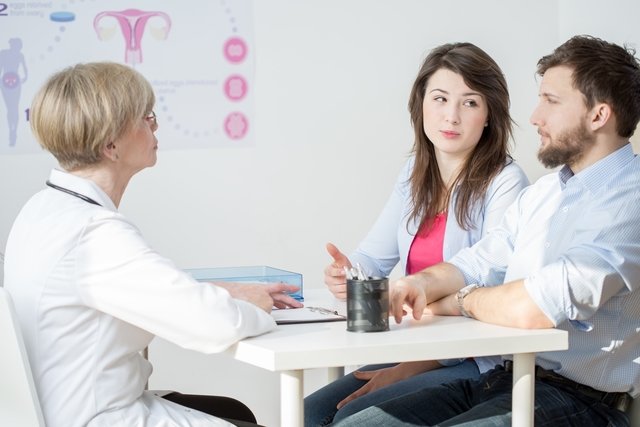Infertility tests must be carried out by both men and women, since changes that can interfere with reproductive capacity can occur in both.
There are tests that must be carried out by both, such as the blood test, for example, and others that are specific, such as the spermogram for men and hysterosalpingography for women.
It is recommended that these tests be carried out when the couple has been trying to get pregnant for more than 1 year but has not been successful. When a woman is over 35 years old, it is recommended that the doctor be consulted first so that the tests can be carried out.

Tests to find out if you can have a child
The main tests that may be recommended by the doctor to assess the couple’s fertility and, thus, know if it is possible to have a child are:
1. Medical evaluation
Medical evaluation is essential in investigating the cause of infertility, as the doctor is able to analyze the factors that may be related to the difficulty in getting pregnant and, thus, indicate the most specific examination and form of treatment. Thus, in the medical evaluation the following factors are evaluated:
- Time the couple has been trying to get pregnant;
- If they have already had a child;
- Treatments and surgeries already carried out;
- Frequency of intimate contact;
- History of urinary and genital infections.
In addition, men also need to provide information about the presence of inguinal hernias, trauma or torsion of the testicles and illnesses they had in childhood because mumps can make it difficult to get pregnant.
Part of the medical evaluation is the physical examination, in which the female and male sexual organs are evaluated with the aim of identifying any structural changes or signs of sexually transmitted infections, which can interfere with the fertility of both men and women.
2. Blood test
The blood test is indicated to check whether there is a change in the amount of hormones circulating in the blood, since changes in the concentration of testosterone, progesterone and estrogen can interfere with the fertility of men and women. In addition, the concentrations of prolactin and thyroid hormones are assessed, as they may also have an influence on reproductive capacity.
3. Spermogram
The spermogram is one of the main tests recommended to investigate a man’s reproductive capacity, as it aims to check the quantity and quality of sperm produced. To carry out the exam, it is recommended that the man does not cause ejaculation and does not have sexual intercourse for 2 to 5 days before the exam, as this may interfere with the result. Understand how the spermogram is done and how to understand the result.
4. Testicular biopsy
Testicular biopsy is used mainly when the spermogram result is altered, to check the presence of sperm in the testicles. If there are sperm that cannot exit with the semen, the man can use techniques such as artificial insemination or in vitro fertilization to have children.
5. Ultrasound
Ultrasonography can be performed on both men, in the case of testicular ultrasound, and women, in the case of transvaginal ultrasound. Ultrasound of the testicles is performed with the aim of identifying the presence of cysts or tumors in the testicles, or diagnosing varicocele, which corresponds to the dilation of the veins in the testicles, leading to the accumulation of blood in the area and the appearance of symptoms, such as pain. , local swelling and feeling of heaviness. Learn how to identify varicocele.
Transvaginal ultrasound is performed to evaluate the presence of cysts in the ovaries, endometriosis, inflammation in the uterus or changes such as tumors or a septate uterus, which may be preventing pregnancy.
6. Histerossalpingografia
Hysterosalpingography is an exam recommended for women with the aim of evaluating gynecological changes, such as blocked tubes, presence of tumors or polyps, endometriosis, inflammation and malformations of the uterus. Understand how hysterosalpingography is performed.
How to get pregnant fast
To promote pregnancy, it is important to avoid stress and anxiety, as these situations tend to interfere with the process. Furthermore, it is essential to have sex during a woman’s fertile period so that the egg can be fertilized by sperm. So, use our calculator to find out the best days to try to get pregnant:
If, even after 1 year of trying to have sex during the fertile period, the couple is still unable to get pregnant, they should go to the doctor to carry out the tests mentioned above to investigate the cause of the problem and start treatment. Find out what are the main diseases that cause infertility in men and women.

Sign up for our newsletter and stay up to date with exclusive news
that can transform your routine!
Warning: Undefined array key "title" in /home/storelat/public_html/wp-content/plugins/link-whisper-premium/templates/frontend/related-posts.php on line 12
Warning: Undefined array key "title_tag" in /home/storelat/public_html/wp-content/plugins/link-whisper-premium/templates/frontend/related-posts.php on line 13



